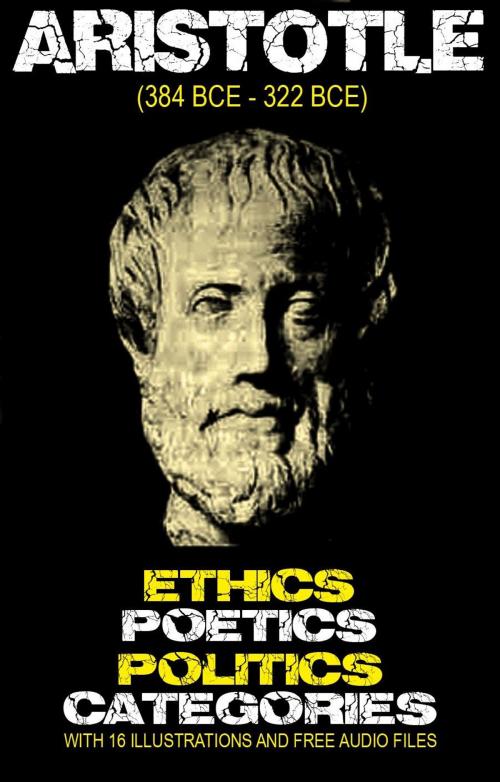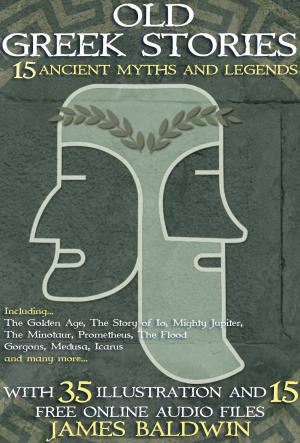Aristotle’s Ethics, Poetics, Politics, and Categories: With 16 Illustrations and Free Audio Files
Fiction & Literature, Horror, Science Fiction & Fantasy, Classics| Author: | ARISTOTLE | ISBN: | 1230002747361 |
| Publisher: | Fugu_Fish Publishing | Publication: | October 27, 2018 |
| Imprint: | Language: | English |
| Author: | ARISTOTLE |
| ISBN: | 1230002747361 |
| Publisher: | Fugu_Fish Publishing |
| Publication: | October 27, 2018 |
| Imprint: | |
| Language: | English |
Aristotle was a Greek philosopher and scientist born in the Macedonian city of Stagirus, in 384 BCE. His writings cover many subjects – including physics, biology, zoology, metaphysics, logic, ethics, aesthetics, poetry, theatre, music, rhetoric, linguistics, politics and government – and constitute the first comprehensive system of Western philosophy.
Aristotle was the pupil of Plato, and went on to teach Alexander the Great.
Here we find four of his famous books in one omnibus edition.
ETHICS
Aristotle first used the term “Ethics” to name a field of study developed by his predecessors Socrates and Plato. Philosophical ethics is the attempt to offer a rational response to the question of how humans should best live.
POLITICS
Aristotle regarded Ethics and Politics as two related but separate fields of study, since ethics examines the good of the individual, while politics examines the good of the city-state.
POETICS
Aristotle’s Poetics is the earliest surviving work of dramatic theory and the first extant philosophical treatise to focus on literary theory. In it, Aristotle offers an account of what he calls “poetry” – a term which in Greek literally means “making” and in this context includes drama—comedy, tragedy, and the satyr play—as well as lyric poetry, epic poetry, and the dithyramb – a song sung to praise Dionysus, the God of wine and fertility.
CATEGORIES
The Categories is a text from Aristotle’s Organon that enumerates all the possible kinds of things that can be the subject or the predicate of a proposition. They are perhaps the single most heavily discussed of all Aristotelian notions. The work is brief enough to be divided, not into books as is usual with Aristotle’s works, but into fifteen chapters. The Categories places every object of human apprehension under one of ten categories.
This book is unabridged and appears as it was first intended.
The audio link will only work on Kobo's iOS and Android apps.
Aristotle was a Greek philosopher and scientist born in the Macedonian city of Stagirus, in 384 BCE. His writings cover many subjects – including physics, biology, zoology, metaphysics, logic, ethics, aesthetics, poetry, theatre, music, rhetoric, linguistics, politics and government – and constitute the first comprehensive system of Western philosophy.
Aristotle was the pupil of Plato, and went on to teach Alexander the Great.
Here we find four of his famous books in one omnibus edition.
ETHICS
Aristotle first used the term “Ethics” to name a field of study developed by his predecessors Socrates and Plato. Philosophical ethics is the attempt to offer a rational response to the question of how humans should best live.
POLITICS
Aristotle regarded Ethics and Politics as two related but separate fields of study, since ethics examines the good of the individual, while politics examines the good of the city-state.
POETICS
Aristotle’s Poetics is the earliest surviving work of dramatic theory and the first extant philosophical treatise to focus on literary theory. In it, Aristotle offers an account of what he calls “poetry” – a term which in Greek literally means “making” and in this context includes drama—comedy, tragedy, and the satyr play—as well as lyric poetry, epic poetry, and the dithyramb – a song sung to praise Dionysus, the God of wine and fertility.
CATEGORIES
The Categories is a text from Aristotle’s Organon that enumerates all the possible kinds of things that can be the subject or the predicate of a proposition. They are perhaps the single most heavily discussed of all Aristotelian notions. The work is brief enough to be divided, not into books as is usual with Aristotle’s works, but into fifteen chapters. The Categories places every object of human apprehension under one of ten categories.
This book is unabridged and appears as it was first intended.
The audio link will only work on Kobo's iOS and Android apps.















